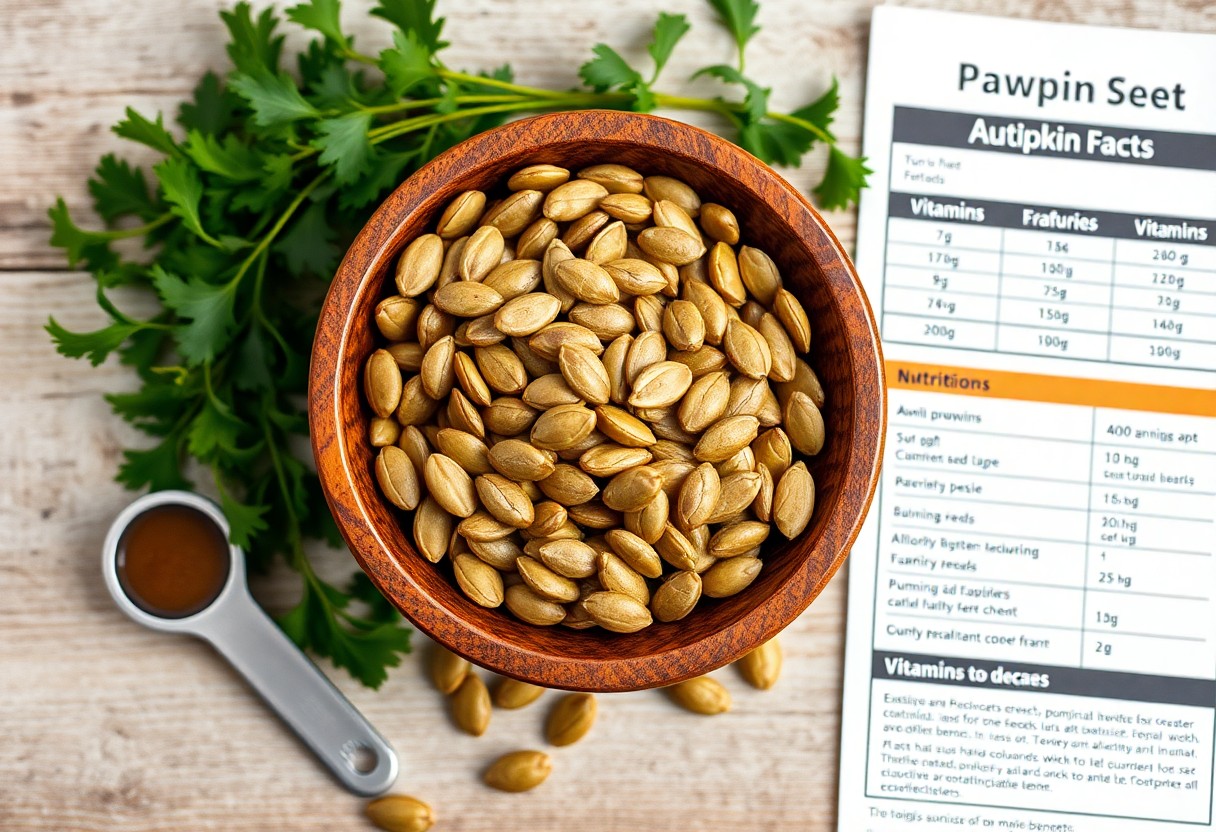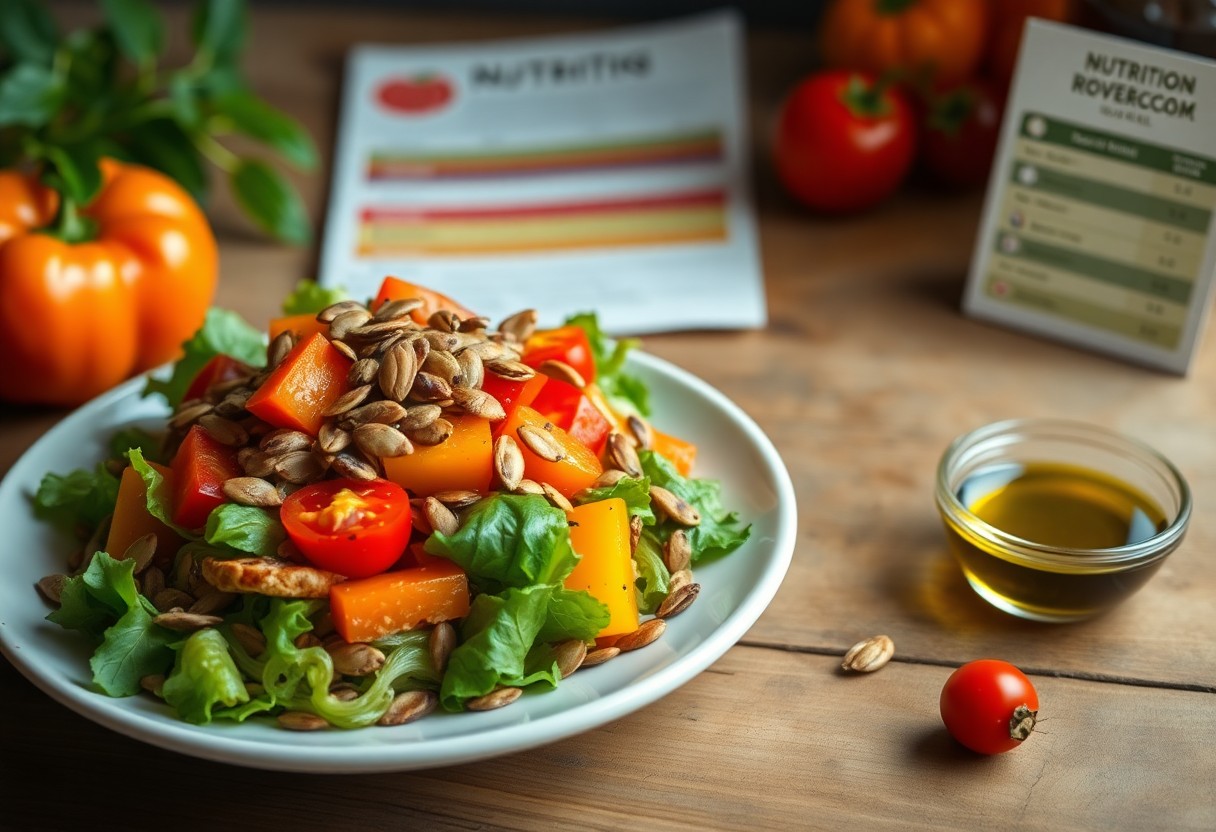Just incorporating pumpkin seeds into your diet can offer a wealth of nutritional benefits. These small yet powerful seeds are packed with important vitamins, minerals, and antioxidants that support overall health. With their rich content of protein, healthy fats, and fiber, pumpkin seeds can play a significant role in your daily meal planning. Discover how these nutrient-dense seeds can enhance your well-being and provide you with lasting energy throughout the day.

Nutritional Breakdown: A Deep Dive into Pumpkin Seeds
Pumpkin seeds, or pepitas, stand out nutritionally, offering a wealth of health benefits and necessary nutrients. These small yet powerful seeds are packed with protein, healthy fats, and a variety of vitamins and minerals that contribute to overall wellness. Including pumpkin seeds in your daily diet can enhance your nutrient intake significantly, providing a convenient source of energy and various health-promoting compounds.
Essential Vitamins and Minerals
Your intake of pumpkin seeds provides several key vitamins and minerals, including magnesium, zinc, iron, and vitamin K. Magnesium is vital for numerous biochemical reactions in your body and supports muscle and nerve function. Zinc plays a crucial role in immune function and cell division, while iron is necessary for transporting oxygen. These nutrients combined make pumpkin seeds a powerful addition to your diet, supporting various bodily functions and overall health.
Macronutrient Profile: Proteins, Fats, and Carbohydrates
Pumpkin seeds are a rich source of macronutrients, offering approximately 30 grams of protein, 49 grams of fat, and 10 grams of carbohydrates per 100 grams. The protein content supports muscle health and repair, while the healthy fats, primarily unsaturated, promote heart health and nutrient absorption. The small carbohydrate amount mainly consists of dietary fiber, which aids digestion and helps maintain steady energy levels throughout the day.
With their protein content being around 30% of their total weight, pumpkin seeds provide necessary amino acids necessary for your body. These seeds contain monounsaturated and polyunsaturated fats, contributing to healthy cholesterol levels. Fiber enhances digestive health and stabilizes blood sugar levels, making pumpkin seeds an excellent option for energy management. A daily serving can effectively support your nutritional needs while offering a delicious crunch in salads, smoothies, or as a standalone snack.
The Power of Antioxidants: How Pumpkin Seeds Fight Free Radicals
Antioxidants in pumpkin seeds play a vital role in combating oxidative stress in your body. By neutralizing free radicals, these compounds help reduce cellular damage, promoting better overall health. The antioxidant properties of pumpkin seeds can fend off various chronic conditions, contributing to your long-term wellness. Incorporating these seeds into your diet enhances your body’s defense system, making it more resilient against the effects of aging and environmental toxins.
Key Antioxidants Found in Pumpkin Seeds
Vitamin E, zinc, and phytosterols are key antioxidants in pumpkin seeds that support your body’s ability to fight oxidative stress. Vitamin E protects cell membranes from damage, while zinc plays a significant role in immune function and cellular repair. Phytosterols help lower cholesterol levels, further enhancing heart health. Including these antioxidants in your diet empowers your body with important tools for maintaining vitality.
Role in Reducing Inflammation and Chronic Disease
The antioxidants in pumpkin seeds contribute to lowering inflammation, a key factor in chronic diseases. Regular consumption helps modulate inflammatory pathways, reducing the risk of conditions like arthritis, heart disease, and certain cancers. You can improve your inflammation markers by integrating pumpkin seeds into your meals, leading to better health outcomes.
Evidence suggests that the anti-inflammatory effects of pumpkin seeds may significantly impact chronic disease prevention. For instance, studies indicate that the magnesium and zinc in these seeds help regulate inflammatory responses, potentially lowering the incidence of metabolic syndrome and cardiovascular diseases. By including pumpkin seeds in your daily diet, you support your body’s mechanisms against inflammation, promoting longevity and overall well-being.
Pumpkin Seeds as a Plant-Based Protein Source: Ideal for Foodie Flexitarians
As a versatile ingredient, pumpkin seeds provide a rich plant-based protein source perfect for foodie flexitarians. Incorporating them into your meals enhances not only flavor but also nutrient density, making them an excellent addition to salads, smoothies, and snack mixes. With significant protein content, they can serve as a satisfying alternative to traditional animal protein sources, ensuring you maintain a balanced diet without sacrificing taste.
Protein Content Compared to Other Sources
Protein Content Comparison
| Food Source | Protein per 100g |
|---|---|
| Pumpkin Seeds | 30g |
| Chicken Breast | 32g |
| Tofu | 8g |
| Quinoa | 4g |
Benefits for Muscle Health and Recovery
Pumpkin seeds can significantly support your muscle health and recovery post-exercise. Rich in protein, magnesium, and zinc, they promote muscle repair and growth, making them ideal for anyone engaged in regular physical activity. Their amino acid profile contributes to efficient protein synthesis, which is necessary for maintaining muscle mass and enhancing overall strength.
Integrating pumpkin seeds into your diet aids recovery due to their anti-inflammatory properties, which reduce muscle soreness and fatigue. The high magnesium content aids in muscle function and replenishes energy levels, while zinc plays a critical role in the maintenance and repair of body tissues. Consuming this nutrient-dense seed after workouts can elevate your recovery routine, leading to improved performance and a quicker return to your fitness regimen.
The Heart-Healthy Profile of Pumpkin Seeds: A Cardiovascular Companion
Incorporating pumpkin seeds into your daily diet enhances your heart health, thanks to their rich nutrient content. These small but mighty seeds are packed with heart-healthy fats, fiber, and a variety of vitamins and minerals that work together to support cardiovascular wellness. By adding pumpkin seeds to your meals, you can take a proactive approach to maintaining a healthy heart and reducing the risk of cardiovascular disease.
Heart-Boosting Nutrients and Their Roles
Pumpkin seeds are an excellent source of magnesium, zinc, and healthy fats, which play significant roles in heart health. Magnesium helps regulate blood pressure, while zinc supports immune function and overall cardiovascular health. Additionally, the unsaturated fatty acids found in pumpkin seeds help to lower cholesterol levels, contributing to a healthier heart.
Studies Linking Pumpkin Seeds to Improved Heart Health
Research indicates a strong correlation between pumpkin seed consumption and improved heart health. Studies have shown that regular intake of pumpkin seeds can lead to lower cholesterol levels, reduced blood pressure, and a decreased risk of heart disease. These benefits stem from the combined effects of their nutrient profile, which targets various cardiovascular risk factors.
A 2018 study published in the journal "Nutrients" highlighted that participants who included pumpkin seeds in their diet experienced a significant decrease in LDL cholesterol levels and improvements in overall cardiovascular health markers. Another study found that magnesium-rich foods like pumpkin seeds were associated with a lower risk of heart disease. These findings underscore the importance of incorporating pumpkin seeds into your diet as a simple yet effective way to support heart health.

Practical Ways to Incorporate Pumpkin Seeds into Your Diet
Incorporating pumpkin seeds into your daily diet is simple and enjoyable. You can sprinkle them over salads for added crunch, blend them into smoothies for a nutrient boost, or use them as a topping for yogurt and oatmeal. Roasting pumpkin seeds enhances their flavor, making them a delightful snack on their own. Try mixing them into homemade granola or energy bars for a healthy treat. With their versatility, finding creative ways to enjoy pumpkin seeds becomes a tasty challenge.
Creative Culinary Uses and Recipes
Experimenting with pumpkin seeds opens a world of culinary possibilities. You can create a vibrant pesto by blending pumpkin seeds with fresh herbs and olive oil, or incorporate them into baked goods like muffins and bread for extra texture. Adding them to stir-fries or grain bowls elevates your meals while bringing a nutty flavor. For a quick snack, consider making spiced pumpkin seed clusters with honey and your favorite seasonings, providing a satisfying crunch that satisfies cravings.
Portion Control and Daily Serving Recommendations
Serving sizes are key to reaping the benefits of pumpkin seeds without overindulging. A daily serving of about 1 ounce, or roughly a small handful (28 grams), is recommended for optimal health benefits. This amount provides crucial nutrients without excessive calories, fitting well into a balanced diet. Adjust the serving size based on your overall nutritional goals and activity level.
Staying within the recommended 1 ounce serving of pumpkin seeds ensures you receive up to 150 calories, approximately 7 grams of protein, and a healthy dose of magnesium and zinc. Overconsumption can lead to excess calorie intake, potentially disrupting your diet plan. While pumpkin seeds offer myriad health advantages, including heart health and improved digestion, moderation plays an crucial role in maximizing their benefits while maintaining your dietary balance.
Summing up
Hence, incorporating pumpkin seeds into your daily diet can significantly boost your nutritional intake. They are rich in vital nutrients, including magnesium, zinc, and healthy fats, which support various bodily functions. Regular consumption may enhance heart health, improve sleep quality, and provide anti-inflammatory benefits. By adding pumpkin seeds to your meals or snacks, you not only enrich your diet but also promote overall wellness, making them a valuable addition for your health-focused lifestyle.
FAQ
Q: What are the nutritional components of pumpkin seeds?
A: Pumpkin seeds are rich in protein, healthy fats, fiber, magnesium, zinc, and iron. A one-ounce serving typically contains about 7 grams of protein, 13 grams of fat, and 5 grams of carbohydrates, along with various vitamins and minerals.
Q: How do pumpkin seeds benefit heart health?
A: Pumpkin seeds contain high levels of magnesium, which helps regulate blood pressure and promotes heart health. The healthy fats in pumpkin seeds, mainly unsaturated fats, also contribute to lower cholesterol levels.
Q: Can pumpkin seeds aid in weight management?
A: Yes, pumpkin seeds are a good source of protein and healthy fats, both of which can help increase feelings of fullness and reduce overall calorie intake, making them beneficial for weight management.
Q: Do pumpkin seeds support sleep quality?
A: Pumpkin seeds are a natural source of tryptophan, an amino acid that can help improve sleep quality. They also contain magnesium, which can contribute to better sleep and relaxation.
Q: How can pumpkin seeds be incorporated into a daily diet?
A: Pumpkin seeds can be easily added to smoothies, salads, oatmeal, yogurt, or used as a snack on their own. They can also be roasted for added flavor and crunch in various dishes.

0 Comments